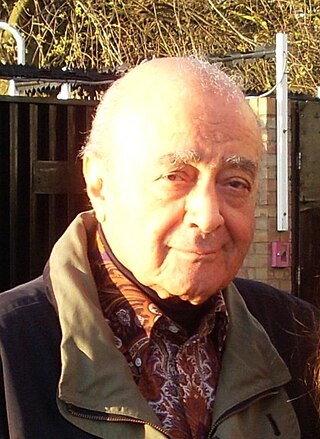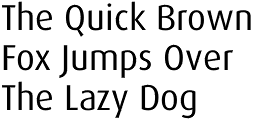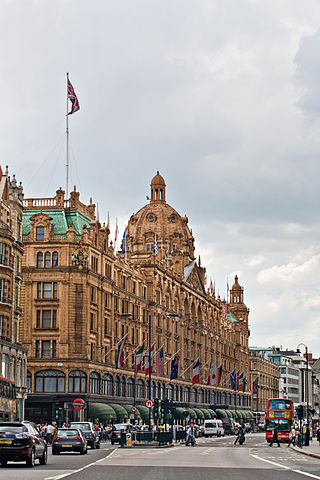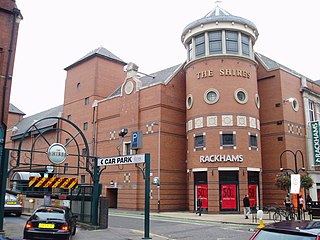Related Research Articles

Mohamed Al-Fayed was an Egyptian businessman whose residence and chief business interests were in the United Kingdom from the mid-1960s.
The apostrophe is a punctuation mark, and sometimes a diacritical mark, in languages that use the Latin alphabet and some other alphabets. In English, the apostrophe is used for two basic purposes:

The Daily Telegraph, also nicknamed The Tele, is an Australian tabloid newspaper published by Nationwide News Pty Limited, a subsidiary of News Corp Australia, itself a subsidiary of News Corp. It is published Monday through Saturday and is available throughout Sydney, across most of regional and remote New South Wales, the Australian Capital Territory and South East Queensland.

Harrods is a department store located on Brompton Road in Knightsbridge, London, England. It is owned by Harrods Ltd, a company currently owned by the state of Qatar via its sovereign wealth fund, the Qatar Investment Authority. The Harrods brand also applies to other enterprises undertaken by the Harrods group of companies, including Harrods Estates, Harrods Aviation and Air Harrods.

The alphabet for Modern English is a Latin-script alphabet consisting of 26 letters, each having an upper- and lower-case form. The word alphabet is a compound of the first two letters of the Greek alphabet, alpha and beta. The alphabet originated around the 7th century to write Old English from Latin script. Since then, letters have been added or removed to give the current letters:
Waterstones is a British book retailer that operates 311 shops, mainly in the United Kingdom and also other nearby countries. As of February 2014, it employs around 3,500 staff in the UK and Europe. An average-sized Waterstones shop sells a range of approximately 30,000 individual books, as well as stationery and other related products.

St James' Park is a football stadium in Newcastle upon Tyne, England. It is the home of Newcastle United. With a seating capacity of 52,305 seats, it is the 8th largest football stadium in England.
Keith Spencer Waterhouse was a British novelist and newspaper columnist and the writer of many television series.

Sunrise Records and Entertainment, trading as HMV, is a British music and entertainment retailer, currently operating exclusively in the United Kingdom and Ireland.
In grammar, a noun adjunct, attributive noun, qualifying noun, noun (pre)modifier, or apposite noun is an optional noun that modifies another noun; functioning similarly to an adjective, it is, more specifically, a noun functioning as a pre-modifier in a noun phrase. For example, in the phrase "chicken soup" the noun adjunct "chicken" modifies the noun "soup". It is irrelevant whether the resulting compound noun is spelled in one or two parts. "Field" is a noun adjunct in both "field player" and "fieldhouse".

Cultural heritage is the heritage of tangible and intangible heritage assets of a group or society that is inherited from past generations. Not all heritages of past generations are "heritage"; rather, heritage is a product of selection by society.

Bettys and Taylors of Harrogate, also known as Bettys and Taylors Group Limited, is a family company based in Yorkshire, England. The company's brands are Bettys, Taylors of Harrogate, and Yorkshire Tea. Bettys Café Tea Rooms are traditional tea rooms serving traditional meals with influences from both Switzerland and Yorkshire. Taylors of Harrogate was a family tea and coffee merchant company, founded in 1886, which blended Yorkshire Tea and Taylors of Harrogate Coffee; the owners of Bettys acquired Taylors in 1962. The chairman of the company is Clare Morrow, a former journalist.

The his genitive is a means of forming a genitive construction by linking two nouns with a possessive pronoun such as "his". This construction enjoyed only a brief heyday in English in the late 16th century and the 17th century, but is common in some varieties of a number of Germanic languages, and standard in Afrikaans.

The Harrods bombing refers to the car bomb that exploded outside Harrods department store in central London, England, on Saturday 17 December 1983. Members of the Provisional Irish Republican Army planted the time bomb and sent a warning 37 minutes before it exploded, but the area was not evacuated. The blast killed three police officers and three civilians, injured 90 people, and caused much damage. The IRA Army Council said it had not authorised the attack and expressed regret for the civilian casualties. After the bombing, the IRA shifted its emphasis towards attacks on military targets in England.

Rackhams was a British department store that opened in Birmingham, England in 1881. The business became part of the Harrods group in 1955, before Harrods was purchased by House of Fraser in 1959. As part of the Harrods grouping in House of Fraser, during the 1970s the Rackhams name was selected to be used as the Midlands and parts of the North of England brand name and several stores were added to its portfolio. In 2000 the Rackhams name was retired and replaced by House of Fraser except for the Skipton and Altrincham stores.
The Twentieth Century Society, founded in 1979 as The Thirties Society, is a British charity that campaigns for the preservation of architectural heritage from 1914 onwards. It is formally recognised as one of the National Amenity Societies, and as such is a statutory consultee on alterations to listed buildings within its period of interest.

Short Message Service (SMS) language, textism, or textese is the abbreviated language and slang commonly used in the late 1990s and early 2000s with mobile phone text messaging, and occasionally through Internet-based communication such as email and instant messaging.

In English, possessive words or phrases exist for nouns and most pronouns, as well as some noun phrases. These can play the roles of determiners or of nouns.

Hallensteins Glassons is a New Zealand fashion company based in Auckland, with stores in New Zealand and Australia.

The Co-op Mosaic is a mural in Kingston upon Hull, England, designed by the artist Alan Boyson. Commissioned by the Hull and East Riding Co-operative Society for the exterior of the end of their new store, the mural is sited at the junction of Jameson Street and King Edward Street, now a mainly pedestrianised area created for the City of Culture 2017. The building was erected by 1963. Depicting three stylised trawlers, it commemorates Hull's fishing fleet.
References
- ↑ "The Apostrophe Protection Society". Archived from the original on 17 January 2009. Retrieved 17 October 2010.
- ↑ "Apostrophe Protection Society". ApostropheProtection. Retrieved 29 August 2023.
- ↑ "Apostrophe campaign ends due to 'ignorance and laziness'". BBC News. 29 November 2019. Retrieved 1 December 2019.
- ↑ Lyall, Sarah (16 June 2001). "Boston Journal; Minder of Misplaced Apostrophes Scolds a Town". The New York Times. Retrieved 1 December 2019.
- ↑ Kovacs, Zoltan (16 October 2010), "English speakers split over a squiggle", The West Australian , p. 48
- ↑ "Harrods told to put its apostrophe back". The Sunday Times. 21 August 2006. Retrieved 1 December 2019.
- ↑ Hensher, Philip (12 January 2012). "Leave the apostrophe alone – it makes sense". The Daily Telegraph. Retrieved 1 December 2019.
- ↑ Swaine, Jon (29 January 2009). "Apostrophes abolished by council". The Daily Telegraph. Retrieved 1 December 2019.
- ↑ "Grammarians rejoice as English town drops apostrophe ban". CBC News . 19 March 2013. Retrieved 1 December 2019.
- ↑ Malady, Matthew J.X. (23 May 2013). "Are Apostrophes Necessary?". Slate.com. Retrieved 1 December 2019.
- ↑ McCann, David (12 June 2013). "Bid to change Princes Street name with apostrophe". The Scotsman. Retrieved 1 December 2019.
- ↑ "City Centre". Edinburgh.org. Retrieved 1 December 2019.
Princes Street is a match for any city's main shopping thoroughfare
[ permanent dead link ] - ↑ Laing, Peter (2 October 2015). "Grammar drama follows possessive campaigners' leader's verdict on apostrophe catastrophe". Deadline. Retrieved 1 December 2019.
- ↑ Bloxham, Andy (23 September 2010). "Rogue apostrophe angers Apostrophe Protection Society". The Daily Telegraph. Retrieved 1 December 2019.
- ↑ "Winners of the Ig Nobel Prize". Improbable Research. Archived from the original on 25 February 2011. Retrieved 17 October 2010.
- ↑ Honderich, Holly (9 December 2019). "Do apostrophe's still matter?". BBC News. Retrieved 10 December 2019.
- ↑ "'Laziness has won': apostrophe society admits its defeat". The Guardian. PA Media. 1 December 2019. Retrieved 1 December 2019.
- ↑ "John Richards (1923-2021)". apostrophe.org.uk. Retrieved 12 April 2021.
- ↑ "About". ApostropheProtection. Retrieved 7 February 2022.